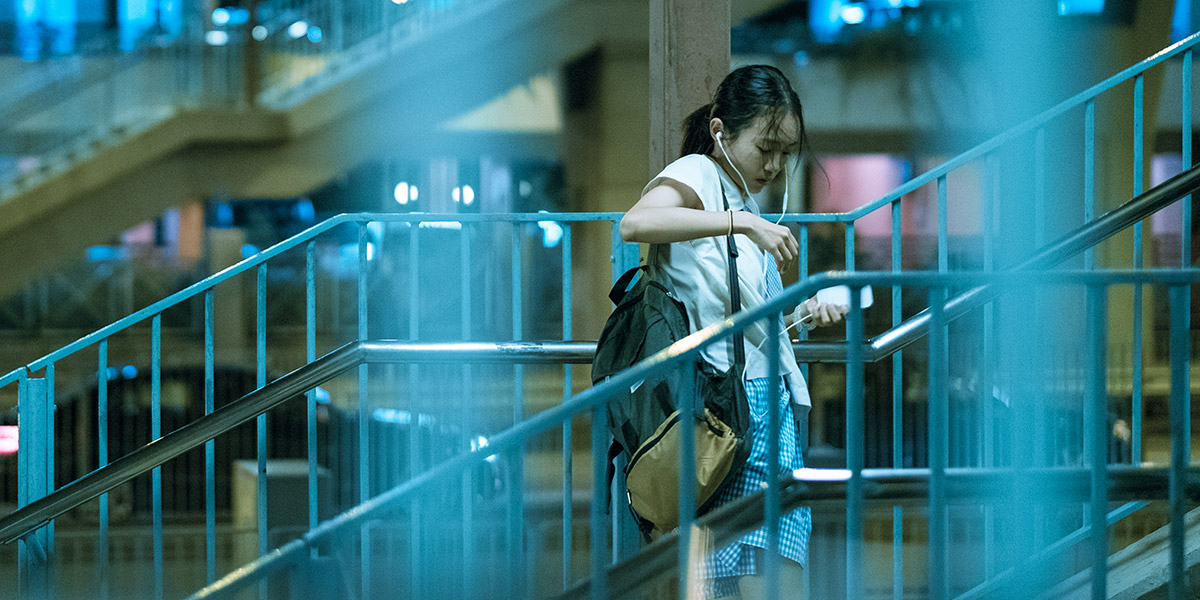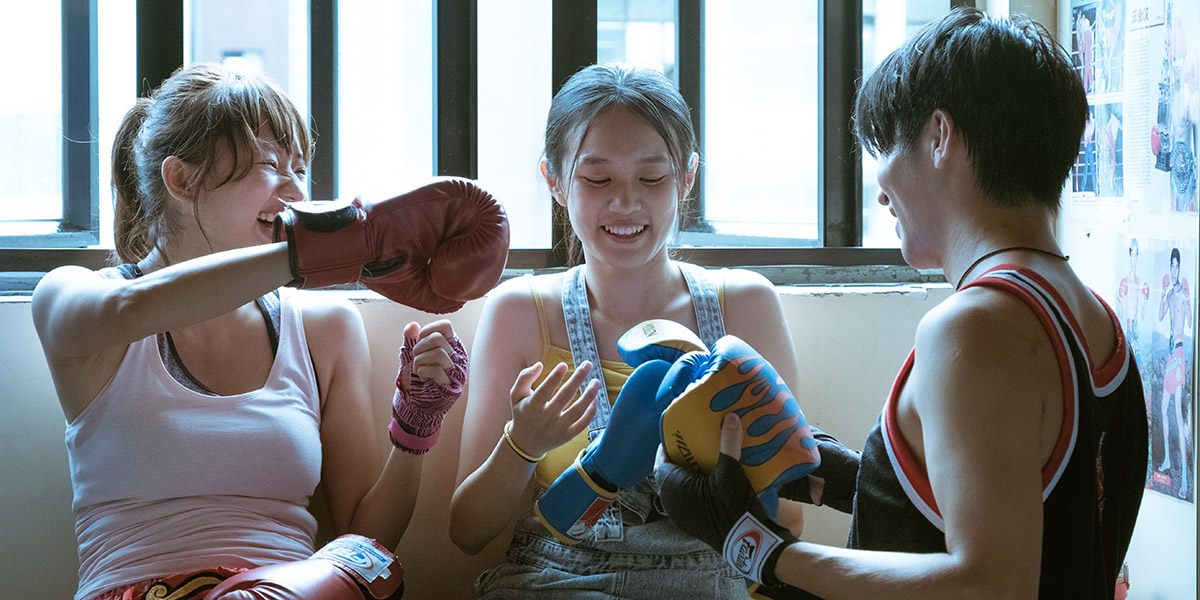Interview: Bai Xue

In our ever-transient, fracturing world, sweeping discussions about identity in the name of personal or political edification tend to overshadow subtle, often more profound ruminations about individualism—those elusive circumstances that drive our fears and desires and steer us through the minutiae of daily toil into the unknown. But in The Crossing, the breathtaking debut feature by Bai Xue, the latter is perfectly distilled in the fulcrum of a girl who comes of age in between two shores divided by regional, national, and linguistic identities.
In the film, Peipei (Huang Yao), a 16-year-old from a broken family in Shenzhen, Mainland China, attends a school for well-heeled teenagers on the other side of the bay in Hong Kong. She needs money to vacation in Japan with her friend Jo (Carmen Soup). Before long, innocent intentions bait Peipei into working for an underground counterfeit iPhone ring that operates between the two borders by way of Jo’s boyfriend Hao (Sunny Sun).
Bolstered by a sophisticated technical polish and audacious tonal shifts—from dynamic handheld shots in Hong Kong to mannered static compositions in Shenzhen—the film’s construction reflects its protagonist’s bifurcated existence in her external domains and emotional states; her divided family life and friendships; her traversal between upper and lower class, childhood and adulthood, and normal life and the criminal underground. Bai integrates thrilling Rififi-esque heist genre elements into tender melodrama while brazenly showing the life-threatening physical dangers and moral quandaries faced by youth living in between worlds struggling to make a living. Peipei isn’t an extraordinary character—she might bring to mind Elia Kazan’s description of Barbara Loden’s Wanda as a woman who “float[s], like debris” through life, and, in Bai’s words, she can “disappear into a crowd”—but through her search for purpose and belonging, the director unfolds complex, nuanced notions of what it means to be a young person living in the world today.
The Crossing was executive produced by Tian Zhuangzhuang (The Horse Thief) and edited by Mathieu Laclau (A Touch of Sin), and received an honorable mention from the NETPAC Jury at the Toronto International Film Festival. Film Comment interviewed Bai on the occasion of her film’s world premiere there.
Congratulations on your first feature. Because a lot of festival audiences are being introduced to your work for the first time, I wonder if you could talk a little bit about your background and how you got into filmmaking.
I graduated from the Beijing Film Academy in 2007. The last 10 years have been tumultuous, because it’s often difficult for young directors to get feature films produced and exhibited in China. However, new opportunities such as support programs and grants have recently been made available to an upcoming generation of young filmmakers. This is what allowed me to finally make my first feature.
How did you begin to conceive of the script for The Crossing? What was the writing process like and how did it evolve over time?
About three years ago I learned about these kids who transport illegal merchandise across the Mainland Shenzhen border to Hong Kong. Shenzhen is a very familiar milieu to me because I moved there when I was 6 years old. So I found the subject of these children to be highly relatable. I delved into an intensive research period to find out every aspect of these characters. I interviewed customs agents, the counterfeit cell-phone sellers to learn the ins and outs of this underground market. I also talked to a lot of girls who go to school in Hong Kong, taking down extensive notes totaling tens of thousands of words. That became the foundation for the script. From this foundation, I created a storyline.
During this process, I developed a deep emotional bond to girls who share the plight of Peipei. They are a very unique, special group. They traverse both the shores of Hong Kong and Shenzhen, so their identity reflects both the historical and cultural backgrounds of these two cities. A fascinating synthesized existence comes out of the duality of geographic and cultural backgrounds they experience on a daily basis. From this lived reality, I began to try put myself in Peipei’s shoes. I asked myself what I would do every day if I were in her place. What would she do after school? Maybe she’d be looking to get into some trouble, because although she occupies both borders, she cannot find belonging on either side. So eventually she begins to carry these counterfeit phones between borders and finds a sense of purpose. Obviously she will eventually get punished for doing that, and I thought that central conflict in the story provided a symmetry to the internal identity crisis she was suffering. Through this conflict, however, she also finds her inner bravery and confidence.
Why was it important for this character to be between childhood and adolescence?
In Hong Kong, you can start working when you are 16. And girls in Hong Kong seem relatively sophisticated and mature by the time they reach 18. Around 16, you think you know everything, and your place in the world, but you don’t know how much you don’t know.
How did the production evolve from the script level to production and how did Tian Zhuangzhuang become involved as the executive producer?
The Young Director Support Program, which is backed by the China Film Directors’ Guild, is one of the really great new platforms for young directors I was referring to earlier. I was one of the top five filmmakers in the Program’s second year. This lead to support from the Wanda Group, which also gave me access to veterans of the industry as mentors along the different stages of production. This is how Tian Zhuangzhuang came to the project. But actually, Prof. Tian and I had a preexisting relationship that dates back to my time at the Film Academy. He has been familiar with and interested in my work since then. I didn’t show him the script until it was finished. He was really struck by it and offered to help.

How did you envision the look of the film? There’s a very unique visual style and pacing to the film and to my mind it’s the work of someone very well-versed in the language of international art-house cinema, like you have taken inspiration from other films or filmmakers but created this very idiosyncratic style of your own. I wonder if you could talk about how you developed this aesthetic.
I’m very happy to say that the final film hewed so closely to how I envisioned it to look from the start. I admire that recent European and American independent films have found a way to advance their narratives through their distinct visual styles. I wanted to incorporate a similar aspect into my film, on the level of cinematography, editing, soundtrack—I focused a lot of attention on these components that were crucial to the storytelling.
In postproduction, including the editing process, we sought to develop and heighten the style and pace of the film to further embody the spirit of the story being told. For instance, we didn’t include a lot of transitions, so the cuts between scenes would be relatively abrupt. This throws the viewer into the action very quickly, which reflects the film’s teeming urban milieus. In terms of cinematography, we wanted to represent the characteristics of these two distinct cities in a visual way. Hong Kong is a concrete jungle, very crowded, narrow and vertical. The mise en scène is kinetic, swarming with action and movement, and most of the shots were handheld. This also reflects Peipei’s state of mind when traversing this city. On the other hand, the shots in Shenzhen were still compositions, expansive and consisted more of landscapes and long shots. I think the duality of the film’s visual language allows audiences to enter into Peipei’s perspectives.
With the soundtrack, I listened to different kinds of music even from the writing stage. The music reflects this duality, too. I listened to both very fast-paced electronic music and more slow, languid piano and analog music. These two music genres reflect her two main states of mind.
I think Peipei, deep down, is a very brave girl.
Could you could talk a little bit about the process of filming on location, both in Shenzhen and Hong Kong, especially the very kinetic moving shots through the outdoor and indoor train stations. There’s so much naturalism in those scenes.
We put in a lot of effort to persuade the Shenzhen customs agents to allow us to film there. It was a long, arduous process and no other film has been shot there before. Our very dedicated producers waited outside the office every morning to talk to the agents and eventually moved them with our passion and determination.
We had a whole other set of difficulties filming in Hong Kong. At the point of crossing on the Hong Kong side, filming was strictly forbidden. We actually had to find a harbor where we could re-create the crossing point. The whole set had to be constructed, and all the extras were professional actors we cast. I wanted the film to have a naturalism, to appear realistic. But in order to achieve this, I had to employ all these different techniques. In the end, we managed to realize the exact look I was going for.
And can you talk about the casting—how did you find the actress for your main character?
I think I was very lucky to find Huang Yao, the actress who plays Peipei. She’s a godsend—a total gem. She was introduced to me by a friend who works as an agent in Hong Kong. She has a unique background, having been born and raised in Foshan [near Shenzhen], but to a family of northerners. I was adamant that the actress must be fluent in both Cantonese and Mandarin. It was difficult to find the perfect actress for the main character. She has a background in theater, so she’s a highly professional actress. When we found her, some people on the production weren’t sure it was the right decision, but I had seen videos of her performing, and I felt that one of her most striking characteristics was her ability to act with her eyes. Another unique aspect to Huang Yao is that unlike a lot of other young actors who have very ostentatious looks, she has an ability to disappear in a crowd. This quality is shared by Peipei. I feel part of the success of the film can be attributed to Huang because her performance evokes so much empathy for the character.
Is there a larger symbolic significance to a character such as Peipei in our world today, and for a film like this, in the post–Umbrella Revolution, pre-2046 milieu, with the tenuous relationship between Hong Kong and Mainland being what they are?
I’m not interested in talking directly about politics. I’m not here to make conclusive statements about the two territories. But telling the story of such a unique character, portraying her daily existence, I hope to shed light on the complex spectrum of humanity that exists in between the two shores.
Aliza Ma is a New York–based programmer and writer specializing in Asian cinema.







